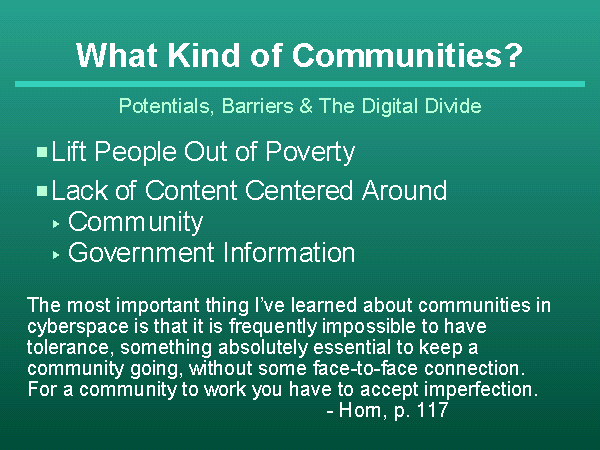





 Notes:
Notes:
In an article entitled "Who Got Dibs on the Digital Divide?" OMB Watch quotes President Clinton as saying, "...[t]he new information economy has the potential, at home and around the world, to lift more people out of poverty more quickly than at any previous period in all of human history and that tapping that potential is actually in our enlightened self-interest."
The article also cites a study (by Cheskin) suggesting: "a potential barrier to online participation through mainstream Internet web sites and portals is the lack of content centered around community and government information that speaks to particular needs and interests..." Reference: OMB Watcher Online, Vol. 1 No. 7, April 24, 2000
http://www.ombwatch.org/ombwatcher/
Rheingold notes: "There is no such thing as a single, monolithic, online subculture; it's more like an ecosystem of subcultures, some frivolous, others serious. The cutting edge of scientific discourse is migrating to virtual communities, where you can read the electronic pre- preprinted reports of molecular biologists and cognitive scientists. At the same time, activists and educational reformers are using the same medium as a political tool."
One site that is endeavoring to use CMC as a political tool is SpeakOut.com -- which aims to establish a vitual community of folks who wish to make their voices more effectively heard by their elected officials. For this project, I was among the first 1000 subscribers to SpeakOut.com. As one who has an ongoing interest in communicating effectively in the political process, my inclination to remain a member of the SpeakOut community will depend upon increasing the flexibility of the service to address the specific issues of concern to its members, as opposed to those that are merely identifed by its hosts. The over-reliance on glitz and graphics is a significant impediment to my continued participation.















